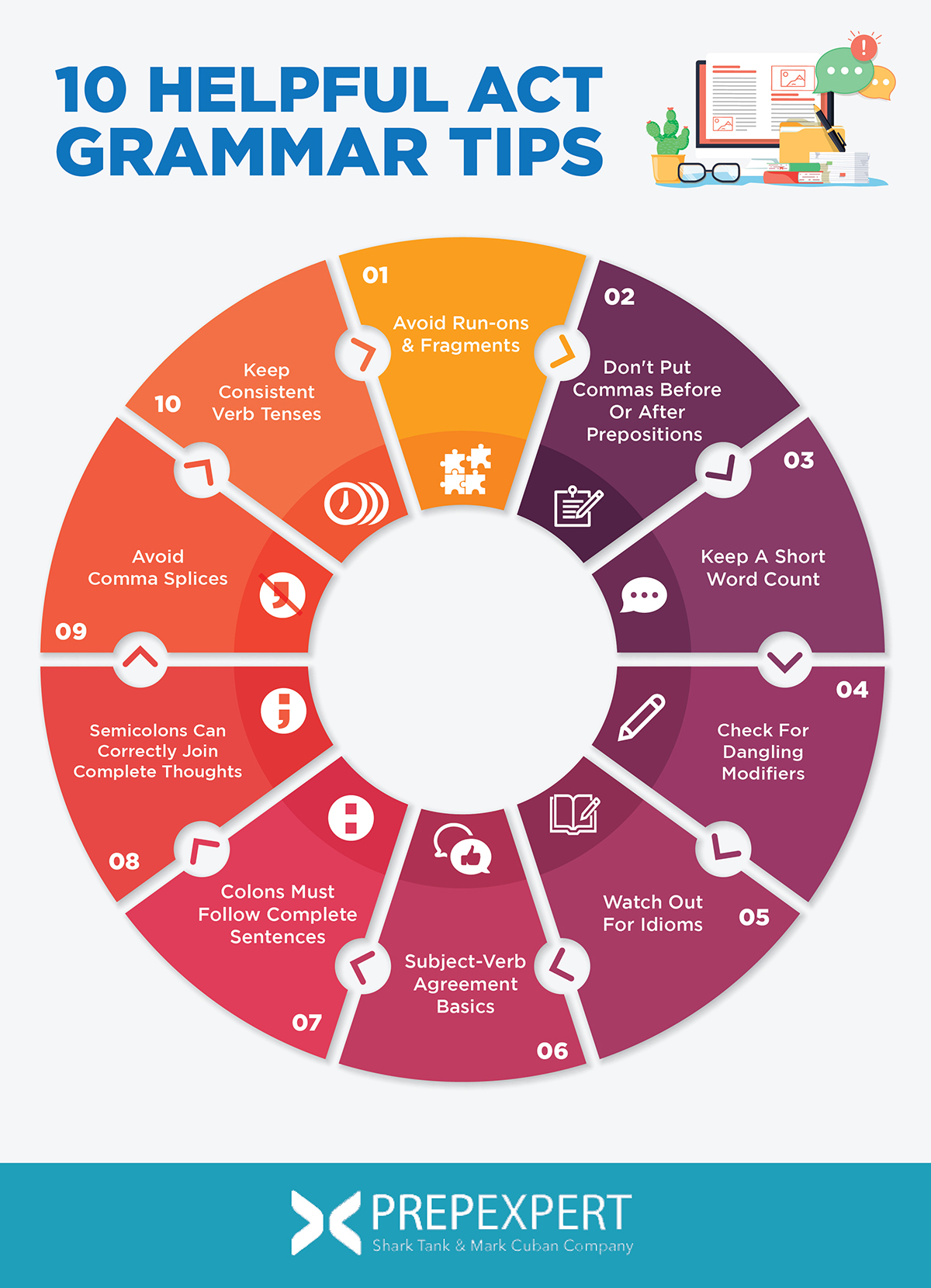10 Helpful ACT Grammar Tips
The ACT English section presents students with plenty of challenges by making them focus on every grammatical detail. The test makers are more than happy to trip you up by slipping grammar mistakes so basic that you might miss them. Unfortunately, missing those details will take off points from your final score.
To make life simpler, here are 10 ACT grammar tips to keep in mind when both practicing for and taking the test itself.
Don’t forget to learn more about our ACT prep courses by checking them out today.
[act_one]

Avoid Run-ons & Fragments
Don’t get tricked by long fragments or run-on sentences.
A complete sentence has to have one primary clause, consisting of a subject and corresponding predicate, with correct punctuation. A complete sentence can have multiples clauses, as long as they are connected by correct punctuation. If a sentence lacks a primary clause, then it’s a fragment. Simple as that.
A run-on sentence contains multiple, complete thoughts that aren’t correctly connected by punctuation. Remember that sentence length alone doesn’t signify whether or not a sentence is correctly formed. Look for subjects and predicates, and make sure that multiple clauses are connected correctly by either commas or semicolons.
[leadmagnet_five]

Don’t Put Commas Before Or After Prepositions
A known ACT English trick is placing commas before prepositions; don’t fall for it.
On the test, it is always wrong to place a comma after a preposition. It is also incredibly rare to insert before one too. There is one exception, and that is when a preposition is used to introduce a non-restrictive clause.
To be fair, this situation is typically rare on the ACT, but it does happen just enough to make knowing the rule important. If you see a comma directly before or after a preposition, something is definitely up.

Keep A Short Word Count
Shorter sentences are normally your best bet.
Among answer choices, the shortest yet grammatically correct one that communicates all pertinent information is correct. Moreover, shorter sentences are easier to understand and use when writing. On the test, any answer choices that unnecessarily add words or phrases that don’t communicate helpful information can be discarded.

Check For Dangling Modifiers
A common error ACT English (and SAT Writing) questions employ is using dangling and misplaced modifiers.
In short, modifiers are phrases or words that modify an additional word to provide additional information. If you see a modifier in a sentence that’s followed by a comma, make sure that it is providing more information about the word or phrase that immediately follows. if it does not, then that modifier is dangling. It exists without a purpose within that sentence.

Watch Out For Idioms
Idioms are common expressions that are commonly tested on the ACT.
Common idioms you should know include “neither…nor”, “not only…but also”. These examples are known as two-part idioms. Another subset of idioms to watch out for are prepositional idioms. Examples of this form include “opposed to” and “participate in”.
Because there are no hard-set rules for these idioms, your best bet instead is to memorize the most common ones and practice using them. If you come across sentences where their placement and usage sounds off, then those are likely incorrect answer choices.

Subject-Verb Agreement Basics
The ACT English section will often separate verbs and subjects in sentences, in order to trip you up.
To avoid trouble, always be able to identify a sentence’s subject and make sure that the verb form correctly matches it. If the tenses do not agree, for example, in certain answer choices, then discard them immediately.
If collective nouns are used, like “group”, “committee”, “crowd”, etc., and the accompanying verb is not singular, then discard those choices too. Always be able to correctly assess a sentence’s verb-subject agreement.
[act_two]

Colons Must Follow Complete Sentences
Colons normally present either explanations or lists.
The key to remember when using colons is that they must follow a complete sentence. Do not use one following a fragment. If the preceding thought does not work as a complete sentence, then you CANNOT drop in the colon. It may seem arbitrary to know, but the ACT has no problem tricking you with minor details.
[leadmagnet_two]

Semicolons Can Correctly Join Complete Thoughts
To easily fix a comma splice, replace it with a semicolon.
Semicolons function similarly like periods. They are able to clearly indicate two complete, independent thoughts. If you removed a semicolon and replaced it with a period, both thoughts should work as complete sentences.
More importantly, if those two thoughts refer to one another, a semicolon can link them together. On the ACT, remember that if you see a semicolon and both clauses aren’t independent then it’s incorrect. More importantly, if you find a comma splice, substitute a semicolon into the sentence instead.
Avoid Comma Splices
Comma splices are common yet incorrect.
Comma splices occur when two complete, independent thoughts are separated by a comma. Run-on sentences are the most common result of comma splicing.
When using a comma, make sure that both thoughts cannot exist by themselves entirely. If they can exist independently, then you need to adjust your punctuation accordingly. Luckily, you can normally fix the problem with a semicolon.
Keep Consistent Verb Tenses
The primary verb consistency rule to remember is that verbs must remain consistent regarding tense and form within a sentence.
Mixing between the present and future verb tenses in a sentence is a strict no-no. If your sentence starts within the present tense, it must finish in the present tense. If you’re unsure, then check out surrounding sentences for context.
Very often, this trick will help you quickly determine the tense a sentence should correctly have. The ACT English section has no problem trying to trick you with incorrect tenses.
How Prep Expert® Can Help You
Want more ACT grammar tips? Join one of our upcoming ACT classes.
Learning grammar rules and drilling them consistently before taking the ACT is in your best interest. At Prep Expert®, that’s exactly what we do with the students we work with every year.
Our instructors will both teach you the information and strategies you’ll need to memorize, and give you a chance to practice them through weekly practice tests and homework assignments. Each week, you can check your progress and see which sections give you the most trouble.
By the time you finish our course, you will have a strong idea of what to expect and how to tackle it accordingly. We work with materials derived from previously administered ACT tests; so what we give you is what the real thing will look like on test day.
[act_three]
For more test strategy, college admissions, and scholarship application tips sign up for our FREE class happening right now!
Written by Todd Marcus
More from Todd Marcus

Taking The ACT Junior Year
If you're ambitious and want to give yourself plenty of time for score improvement, then consider taking the ACT junior…

ACT 2020 Score Release Dates
Here then are the ACT 2020 score release dates to plan around, as well as, the different kinds of available…

How To Determine Your Average SAT Study Time
If you want a high score on the SAT, then you need to put in the hours. There's no way…



